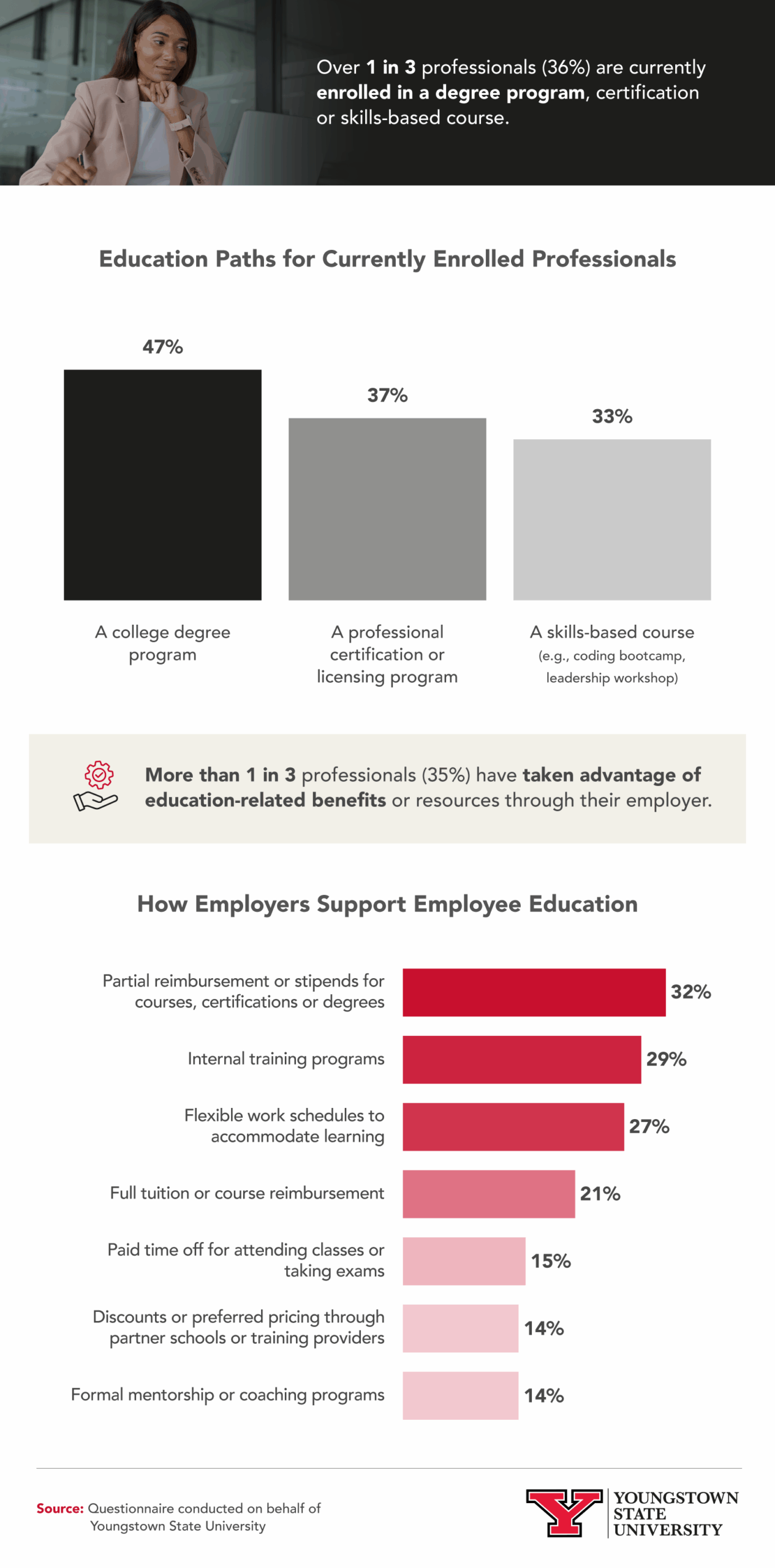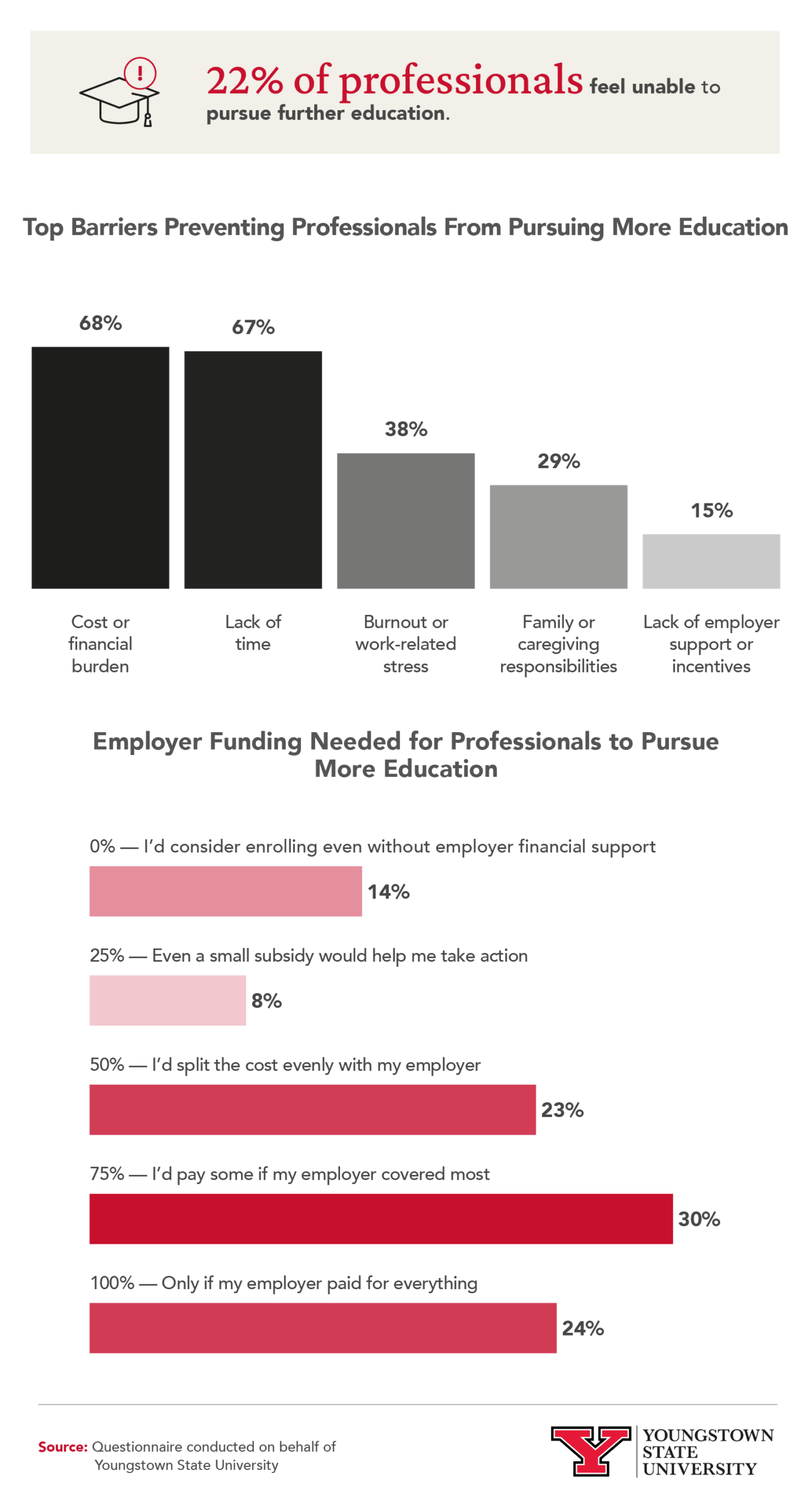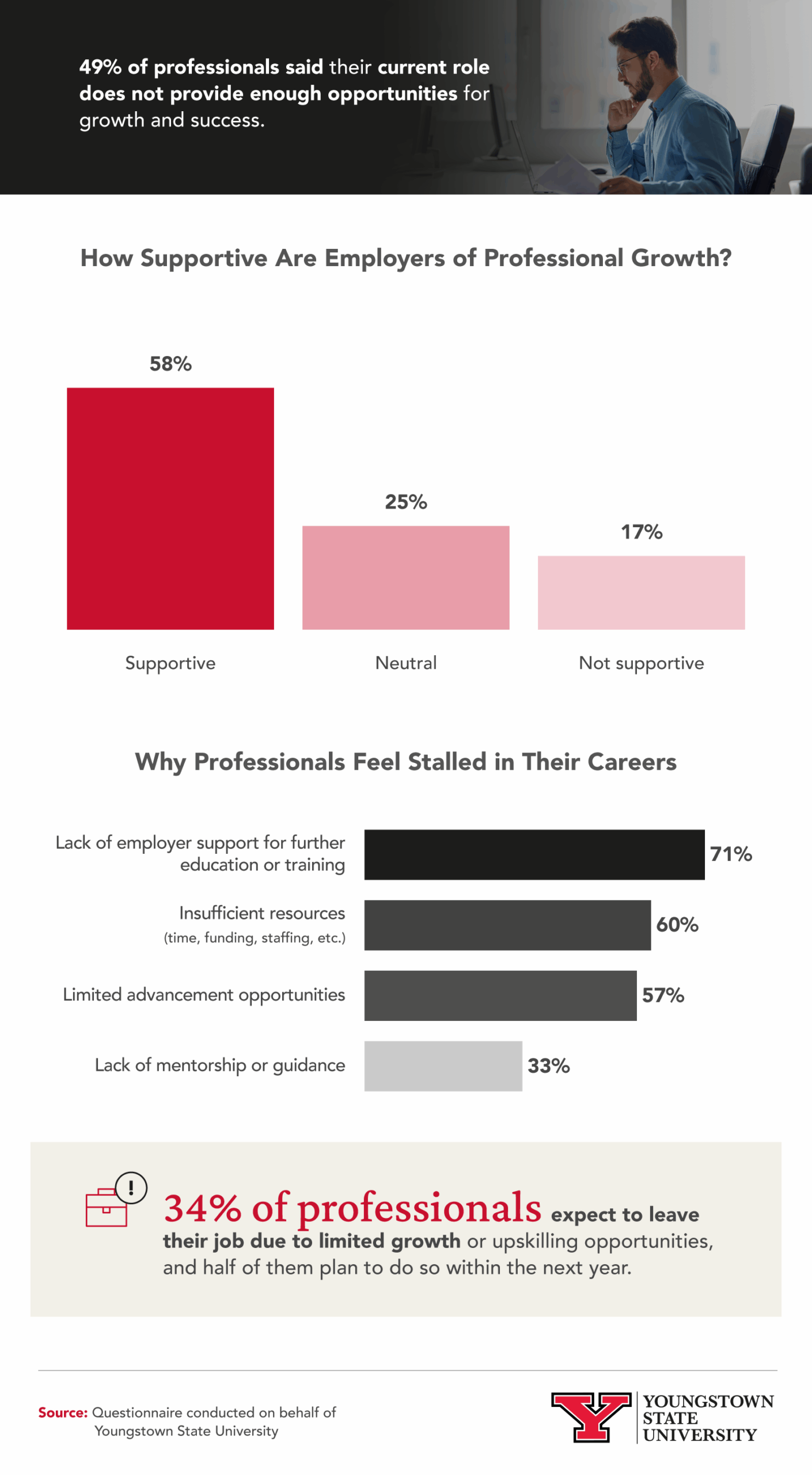
Balancing work, education and personal life is no small feat. Many employers offer educational stipends, training programs or even degree support to encourage continuous learning, but how often do professionals take advantage of those opportunities?
To explore this topic, a national questionnaire of 1,000 full-time workers was conducted on behalf of Youngstown State University (YSU). Professionals shared how they engage with education-related benefits, the barriers they face and how career growth potential shapes their job decisions. This report highlights both the enthusiasm people have for lifelong learning and the challenges of turning that aspiration into reality.
Key Takeaways
- Over one in three professionals (36%) are currently enrolled in a degree program, certification or skills-based course.
- 35% of professionals have taken advantage of education-related benefits or resources through their employer.
- About one in five professionals (22%) feel unable to pursue further education, most often citing cost (68%) and lack of time (67%) as the biggest barriers.
- Only 32% of professionals have employers who actively encourage and support educational development.
- 34% of professionals expect to leave their jobs due to limited growth or upskilling opportunities, with half planning to do so within the next year.
How Professionals Pursue Continued Learning
For many workers, pursuing additional education like a Master of Business Administration (MBA) has become part of their career journey. Learn more about their enrollment rates and how participation varies by generation and industry.

Over one in three professionals (36%) reported being enrolled in some form of continued learning, whether through a degree, certification or skills-based course. Gen Z stood out, with 43% enrolled in a further education path, compared to 35% of millennials and 23% of Gen X. By field, 44% of tech employees, 34% of healthcare workers and 28% of education professionals were engaged in ongoing education.
Enrollment also differed in the types of programs chosen. Nearly three in five Gen Z professionals (59%) were enrolled in a degree program, while 32% pursued certifications and 28% focused on skills-based courses. Among millennials, 49% were in degree programs, 34% in certifications and 34% in skills-based options. Gen X leaned toward shorter-term training, with 44% in skills-based courses, 41% in certifications and 29% in degree programs.
Employers often play a critical role in making this possible. More than one in three workers (35%) had used employer-provided education benefits, such as stipends, tuition reimbursement or flexible schedules. Among industries, 42% of tech professionals reported using these resources, followed by 37% in education and 30% in healthcare.
The Barriers Holding Learners Back
Even with a strong interest in learning, cost and time constraints often prevent professionals from pursuing further education.

Twenty-two percent of professionals feel unable to pursue further education, most often citing cost (68%) and lack of time (67%) as the biggest barriers. Gen X professionals (29%) were more likely to report this compared to millennials (21%) and Gen Z (19%). For Gen X and baby boomers, time was the biggest hurdle, with 70% citing it as their top barrier.
For younger generations, cost weighed heavier: 76% of Gen Z and 68% of millennials said financial strain was their biggest obstacle. Burnout and work-related stress were also keeping 46% of millennials, 43% of Gen Z and 29% of Gen X from pursuing more education. Family and caregiving responsibilities added further limitations, particularly among older professionals.
Some professionals had to make difficult trade-offs. One in five (20%) reported using paid time off, sick days, or unpaid leave to attend classes, exams or other educational events. This shows how many employees are balancing their ambitions for growth against the practical demands of their work schedules.
Employer support can make a difference, but it’s not always consistent. Just 32% of professionals said their employer actively encouraged and supported educational development. Across industries, 36% of education professionals, 35% of those in tech and 31% in healthcare reported strong support. However, 37% of workers said education was talked about in company values but not truly supported in practice.
Why Career Growth Shapes Retention
When opportunities to grow are limited, workers often consider moving on. For many, professional development support is directly tied to career decisions.

Nearly half of professionals (49%) said their current role does not provide enough growth opportunities. Around one-third felt stalled in their careers, including 34% of millennials, 32% of Gen Z and 28% of Gen X. When asked why they felt this way, 71% pointed to a lack of employer support for further education or training, while 60% cited insufficient resources such as time, funding or staffing. More than half (57%) mentioned limited advancement opportunities, and 33% noted a lack of mentorship or guidance.
Career dissatisfaction led to real consequences. Forty-two percent of professionals said they had quit a job because of limited growth opportunities. Another 34% expected to do so, with half of them planning to leave their job within a year. Generationally, 46% of Gen Z workers, 37% of millennials, and 25% of Gen X said they will likely quit due to limited growth or upskilling opportunities.
Industries also showed signs of risk. Healthcare professionals (39%) were most likely to say they expected to leave due to limited opportunities, followed by 33% in technology and 22% in education. Of those planning to leave, 51% in technology, 48% in education and 43% in healthcare expected to do so within a year.
Finding Balance in Work and Learning
While professionals are eager to keep learning, many feel held back by barriers like time and cost. With only a third of workers saying their employer actively supports education, organizations face a real opportunity.
Investing in employee growth could directly impact worker engagement and retention. For workers, finding a balance between career advancement and life responsibilities remains both a challenge and a priority.
Methodology
This report, created on behalf of YSU, is based on a national questionnaire of 1,000 full-time professionals across the U.S., conducted between August 21-25, 2025. Respondents represented a wide range of industries, job levels, educational backgrounds and geographic regions. The questionnaire explored how American workers engage with employer-supported education and upskilling initiatives, including certifications, coursework and advanced degrees such as MBAs.
Participants were asked about their motivations for pursuing continued learning, perceived obstacles and the availability and impact of employer-provided support structures such as stipends, scheduling flexibility and training guidance. The study also captured insights from those who have chosen to delay or forgo further education, identifying common barriers such as time constraints, family obligations, workload or lack of clarity in educational pathways.
While the data provides a timely and directional view of how U.S. professionals experience the intersection of work and learning, it is based on self-reported responses and a limited sample size. As such, findings should be interpreted as indicative rather than definitive.
This is a non-scientific, exploratory questionnaire designed to explore behavioral and attitudinal trends. It is not intended to represent all professionals or potential students.
About Youngstown State University
Youngstown State University offers online MBA programs designed for working professionals who want to advance their careers on their own schedule. Students can complete the 30-credit curriculum in as few as 12 months and choose from concentrations such as Healthcare Management, Marketing, Human Resources and Organizational Leadership, as well as the General MBA option. With multiple start dates and online coursework, YSU’s accelerated MBA degrees combine flexibility with practical, career-focused learning.
Fair Use Statement
The information in this article may be used for noncommercial purposes only. When sharing, please link back to Youngstown State University as the original source.


